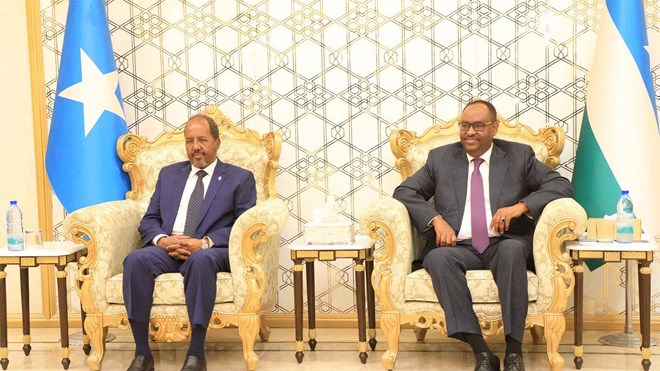Sunday October 6, 2024
By Abdullahi Hassan Mohamed (Samoow)

When Somalia first attempted to embrace federalism, there was hope, a genuine opportunity to rebuild our nation after years of bloodshed and turmoil. The promise of giving regions a voice and establishing power-sharing that respected local needs seemed like a way forward. However, it hasn't worked. What was meant to unite us has only deepened our divisions, leaving us more scattered than ever.
To understand why federalism has failed, we must view Somalia for what it truly is, not through the lens of an academic blueprint for federalism that works in places like Germany or the United States. We are not like those countries. We speak the same language, practice the same religion, and share a common cultural heritage. We do not have the deep ethnic or linguistic divides that necessitate a decentralised federal system. Yet here we are, attempting to mold ourselves into a system that, instead of binding us together, has exacerbated the clan divisions we have struggled to overcome for decades.
The core problem is that our federalism is not merely weak, it is bizarre. It does not resemble a conventional federal structure with a robust central government and well-organised regions. Instead, we have a patchwork of clan territories, each controlled leaders who consider themselves mini-presidents. They do not answer to Mogadishu and only recognise the central government when it suits their interests. These regional leaders make their own deals, call their own shots, and compete with one another for influence, leaving the central government weak and sidelined. How can we build a cohesive nation when every regional leader aspires to be a head of state?
This mess did not arise from a careful, well-planned decision. It was a knee-jerk reaction to the wreckage left in the wake of Siad Barre's fall. After the regime collapsed, warlords tore the country apart, carving it into fiefdoms. When the international community and a few Somali leaders began discussing federalism, it seemed like a quick fix to stabilise the situation, an approach to placate the warlords by giving them a piece of the pie. However, what was intended to be a temporary solution has evolved into a permanent headache.
Consider the events of January 2024, when Ethiopia made a deal with Somaliland to establish a naval base and gain access to our waters. Ethiopia did not even bother consulting Mogadishu. Why? Because it recognises that Somalia's federal system is ineffective. By dealing directly with Somaliland, Ethiopia sent a clear message: Somalia’s central government is so weak that foreign powers can bypass it and negotiate with whomever they choose. This undermines our sovereignty and territorial integrity, plain and simple.
Even more concerning is the fact that it is not just Ethiopia. Al-Shabaab, our most persistent and deadly enemy, is thriving in this fragmented environment. With regional administrations preoccupied with jostling for power, these bloodthirsty terrorists exploit the chaos, establishing strongholds and launching attacks. They understand that we are too divided to mount a unified response and fight back.
The saddest part is that we could have avoided this. We are not a country of incompatible groups struggling to coexist. Our shared language, culture, and faith should have made unification easier, not harder. Yet we have created a system in which every rogue regional leader seeks to prove their superiority. The ones who suffer are ordinary Somalis who yearn for peace and normalcy. Thus, we need a complete reset.
President Hassan Sheikh Mohamud’s recent successes against Al-Shabaab have demonstrated that when the central government is organised, real change is possible. His military campaigns have pushed back against militants and restored some measure of hope. However, these gains will be fleeting unless we address the fundamental issue: our broken system.
What we require is a strong central government that can stand up for all Somalis, a government that does not need to seek permission from regional leaders to make decisions. This does not mean erasing local voices, rather, it is about constructing a nation that functions effectively. We do not need to eliminate regional governments, but we must redefine their roles. It is time to say goodbye to this hybrid clan-federalism that has held us back for too long. We must end this experiment and begin building a state that works for all of us.
We need to engage in a serious national conversation, one that includes everyone, from local communities to regional leaders and civil society, about what kind of state we want to create. Additionally, we must reform our constitution, which is rife with contradictions and gaps that only exacerbate the current dysfunction. We require clear laws that define the distribution of power, leaving no room for opportunistic power grabs. Our institutions must be strong enough to enforce these laws, backed by a professional civil service and a security sector that is loyal to the nation, not to individual regions or clans.
I will be the first to acknowledge that no system is perfect. However, the way we are currently operating is not just imperfect, it is dangerous. Federalism has not brought us closer together, it has pushed us further apart. Unless we take drastic action, it will continue to drag us down. We cannot afford to keep patching a system that was flawed from the beginning. It is time to start over and build a new system that prioritises national unity over petty clan politics.
Our future depends on whether we can finally unite as one people under one government. Only then will we be able to defend our sovereignty, rebuild our nation, and secure lasting peace. Let us turn the page on this failed experiment and embark on the challenging work of creating a Somalia that stands together, strong, united, and prepared to face whatever challenges lie ahead.
Abdullahi Hassan Mohamed (Samoow) is a commentator on political and social affairs in Somalia and an administrative professional based in Mogadishu. He can be reached at: [email protected].